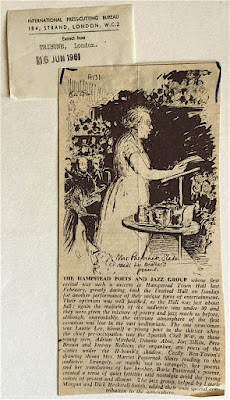 A press-cutting for June 1961 found among the papers of Daniel ('Dannie') Abse, CBE, FRSL (1923 – 2014) well respected Welsh and Jewish poet who worked as a doctor much of his life. From the days of poetry and jazz, duffle coats and beards. The Tribune (a left -wing weekly) emphasises the youth of the audience, this is from a time when 'youth' meant under 30 - the youth movement didn't really begin until 1963 (see Larkin's poem Annus Mirabilis.) Another press-cutting notes the presence of the 'irrepressible' Spike Milligan 'the eminent goon poet.' Press cuttings, like Poetry and Jazz, are surely a thing of the past. Are there agencies still cutting up (and pasting) newspapers that mention their clients?
A press-cutting for June 1961 found among the papers of Daniel ('Dannie') Abse, CBE, FRSL (1923 – 2014) well respected Welsh and Jewish poet who worked as a doctor much of his life. From the days of poetry and jazz, duffle coats and beards. The Tribune (a left -wing weekly) emphasises the youth of the audience, this is from a time when 'youth' meant under 30 - the youth movement didn't really begin until 1963 (see Larkin's poem Annus Mirabilis.) Another press-cutting notes the presence of the 'irrepressible' Spike Milligan 'the eminent goon poet.' Press cuttings, like Poetry and Jazz, are surely a thing of the past. Are there agencies still cutting up (and pasting) newspapers that mention their clients?The Hampstead Poets and Jazz Group whose first recital was such a success at Hampstead Town Hall last February, greatly daring,took the Festival Hall on Sunday for another performance of their unique form of entertainment. Their optimism was well justified, as the hall was just about full; again the majority of the audience was under 30, and they were given the mixture of poetry and jazz much as before, although unavoidably, the intimate atmosphere of the first occasion was lost in the vast auditorium.
The one newcomer was Laurie Lee, himself a young poet in the thirties

.jpg)




